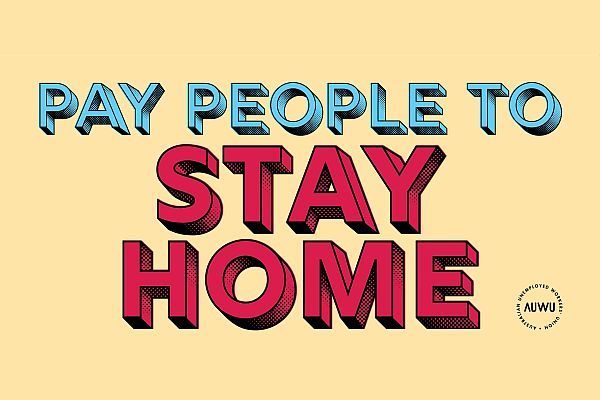With each passing week of the Sydney lockdown, the urgent need for liveable income support has become more blindingly obvious.
After weeks of government resistance, we secured a major victory in late July, when disaster payments were declared not taxable and expanded to some welfare recipients, but millions remain excluded. While the Greens and ACTU have publicly echoed our calls for payments above the poverty line to everyone who needs them, the Labor party still seems intent on stubbornly refusing to acknowledge the existence of people who don’t have a paid job.
Politicians are operating on the false belief that there is no political capital in improving the lives of people hung out to dry through years of state-led abuse, justified by a crass obsession with balancing the budget.
As we watched the same old arguments about austerity and deficits play around the federal budget, the political and media class again demonstrated a depressing lack of imagination and interest in creating a fairer society. And now, with hundreds of thousands of people again losing work or being stood down as the Delta variant smashes us, neither the major parties nor the media have seen fit to mention people on social security payments, let alone suggest that we deserve support.
As a consequence, unemployed people are having to do for ourselves what all political parties and movements have failed to: make the broken social ‘safety’ net and its role in fuelling inequality clear to the wider community. This is why we held our own budget response event, due to the Labor party’s total failure to inspire hope and vision in response to the government’s cruel budget and the Greens’ painful obsession with abstract ‘us vs them’ arguments about tax.
*
We are a prosperous society, yet successive governments have forced millions to rely on poverty payments. Since the mid-2000s, unemployment payments have fallen steadily further below the poverty line – under every government. Before the pandemic, the average time on Newstart was more than three years. By March 2020 hundreds of thousands of people were on $40 a day, barely surviving on half the poverty line.
As the pandemic bore down upon us, the vilification of unwaged workers became less and less tenable. Growing Centrelink queues made headlines; the government was wedged between its religious devotion to neoliberal ideology and hard reality.
The Coalition’s response to millions losing work was anything but what we expected. Hundreds of billions of dollars were pumped into the economy, including the doubling of unemployment payments – bringing them above the Henderson Poverty Line for the first time since calculations began in 1973.
People who were starving themselves, burdened with late fees for falling behind on bills, forced to stay in unsafe homes and jobs, denied healthcare, isolated from friends and unable to afford basic things like clothes, haircuts, school supplies and whitegoods were suddenly given the slightest breathing room, the chance to feel some dignity.
The relief came in waves. Soon brutal ‘mutual’ obligations penalties were suspended, meaning all participation became voluntary. Less financial strain meant relief from anxiety and depression. As people began to see their physical and mental health improve, they felt better equipped to find work they actually had a chance of getting.
These dramatic positive changes to the lives of people on Centrelink payments were not the product of opposition pressure. As the COVID crisis was escalating, the Labor party was nowhere to be seen, continuing to insist that they could not take a position on income support rates until after the next federal election – a position they still hold nearly 18 months on after all the upheaval wrought by the pandemic.
*
For too long, those of us at the bottom of the economic heap have been told by our so-called allies to have patience and argue for ‘change from within’, yet this has achieved nothing more than the can being kicked down the road, election after election.
As the status quo shattered, people hurt by decades of neoliberal policies took their power back. At the Australian Unemployed Workers’ Union we made a decision: no longer would we accept the low ambitions of those who did not share our lived experience.
The Renters and Housing Union coordinated rent strikes, and across the country, tenants negotiated rent reductions. Precarious workers found themselves suddenly valued, and essential workers like those in the United Workers Union and Retail and Fast Food Workers Union took action to win safety protections and better pay. Members of the Casualised, Unemployed and Precarious Uni Workers organised to secure millions in backpay for widespread wage theft by some of the wealthiest universities.
Unemployed people were leading the fight against policies used to hurt waged and unwaged workers alike. The AUWU launched a strike. Members stopped engaging with job agencies, resisting en masse the years of abuse dished out by privatised employment service providers. For the first time, some of the most vulnerable people in society took collective action on a national scale.
https://twitter.com/PDArebellion/status/1290842175324872705
Lockdown restrictions forced us online to find a sense of community. This was a source of strength for the strikers. We shared our experiences of the social security system to feel less isolated.
AUWU members offered mutual aid and moral support to one another, building solidarity and confidence. People who hadn’t known their rights equipped themselves with the knowledge to assist friends and family. Those new to the system learned from those who’d been exposed to it for too long, and people unaffected began to pay attention to how ruinous unemployment is.
The strike didn’t just create a new sense of power among unwaged, underemployed and insecure workers: it helped us find our voice.
When we caught the attention of then Employment Minister Michaelia Cash she described the ever-harshening ‘mutual’ obligations regime she was responsible for as bizarre. In turn, the AUWU received national media coverage and repeatedly exposed her ignorance of that very system. Our influence is steadily growing, And we see fewer people commenting and campaigning about us without us.
We have shifted the Overton window on social security dramatically, both before the pandemic and since. As antipoverty activist Jeremy Poxon put it:
The entire labour movement has failed to improve the lives of the poor. But if it wasn’t for the AUWU, things would be much worse: the drug testing legislation would’ve gone through, cashless cards would’ve spread and Newstart wouldn’t have become a prominent issue.
Over the past year, unemployed workers have built power more quickly than ever.
In 2020 the Greens changed their policy from a $75 per week increase in unemployment payments to match our demand – then a $275 increase – and now explicitly support abolishing ‘mutual’ obligations. GetUp hasn’t just amplified us, but this year began to put material resources into campaigns that advance them, all while letting unemployed people take the lead. Mainstream economists like Richard Denniss have expressed support for the campaign to lift income support to $80 a day.
Until recently, the Henderson Poverty Line was largely excluded from the social security discourse for the frankly incoherent reason that it was deemed too high – perfectly illustrating that researchers and advocates who don’t live in poverty have no idea what it costs to live at the bottom of the income scale.
In March 2021, for the first time, the AUWU stepped up to lead a week of action against poverty. The long list of unions who backed us include the CPSU, UWU, NUS, RAHU, VTHC and Hospo Voice. The week of action took a new approach to social security campaigning. Instead of simplifying the issues, we highlighted the labyrinthine nature of policies that exacerbate harm and reinforce each other: Job agency brutality is not by chance, it is the logical end point of perverse incentives and rules written into social security law; programs like cashless welfare are not just a continuation of colonial violence, they create new opportunities for corporations to profit from our poverty; that these attacks on unwaged workers are also attacks on waged workers.
*
Twelve months on from unemployment payments being made liveable, the government turned the screws on millions-. We are once again struggling on half the poverty line, this time buffeted by lockdowns and another precipitous drop in job prospects without a dollar of extra financial support.
Meaningful change is more urgent than ever. Right now, millions of people are hurting from a drastic reduction in payments thanks to legislation passed by the Coalition in March with Labor party support. The JobKeeper wage subsidy that supported millions of jobs has ended. Nearly a year on from the reintroduction of ‘mutual’ obligations and roughly 300,000 people who became unemployed as a result of the COVID crisis have reached the Annual Activity Requirement, which for most means working unpaid at an unsafe Work for the Dole site.
In February when the prime minister announced an ‘increase’ to payments to the tune of $3 a day, he also announced the full return to mutual obligations, including new and old ones becoming more brutal, and the introduction of the ‘DobSeeker’ line that gives business owners freedom to persecute unemployed people on a whim.
Worst of all, activity requirements like training and forced labour programs would be introduced at six months instead of twelve, as was the pre-COVID requirement. This heralds a new attack, not only on unemployed people, but also on the job security for those in paid employment as this draconian labour market tool will require more people than ever before to perform work for free.
There are hundreds of thousands of people on unemployment payments who are in paid work yet are still required to apply for jobs and may even have to complete work for the dole. There are more employed people on unemployment payments than ever before. There is no benefit to the harsh regime of ‘mutual’ obligations – in fact, these requirements make it less likely you will find a job. Their only function it is to brutalise the poor and use them as a scapegoat in the midst of endless election rumours, whilst destroying industrial laws and workplace protections in the name of neoliberal economics. The ‘new normal’ is nothing but disaster capitalism at its finest.
It took the government far too long to offer support to people who lost hours in the Delta lockdowns. The payments that eventually came are manifestly inadequate, and few people even realise that, in a wave far worse than anything seen in 2020, unemployed people have been offered no help at all.
The ignorance of our suffering was illustrated when ABC radio presenter Raf Epstein, who has extensively covered the economic support package, did not know that unemployed people are excluded from any disaster payments.
The virus is out of control and it’s clear that patchwork responses and aggressive policing aren’t going to stop it. We learned in 2020 that generous, easily accessed income support works. Yet we are forced to watch on in despair as the Labor party and their technocratic gatekeepers continue to call for the return of JobKeeper, despite it evidently being nothing but a corporate bailout in disguise.
Unemployed people are again going it alone to demand we have our voices heard, be treated with dignity and afforded a liveable social safety net. It’s time those with more power to put the heat on Morrison in the political and media class got on board.
Go to part one: Bad and getting worse: why we need an unemployed workers’ movement







